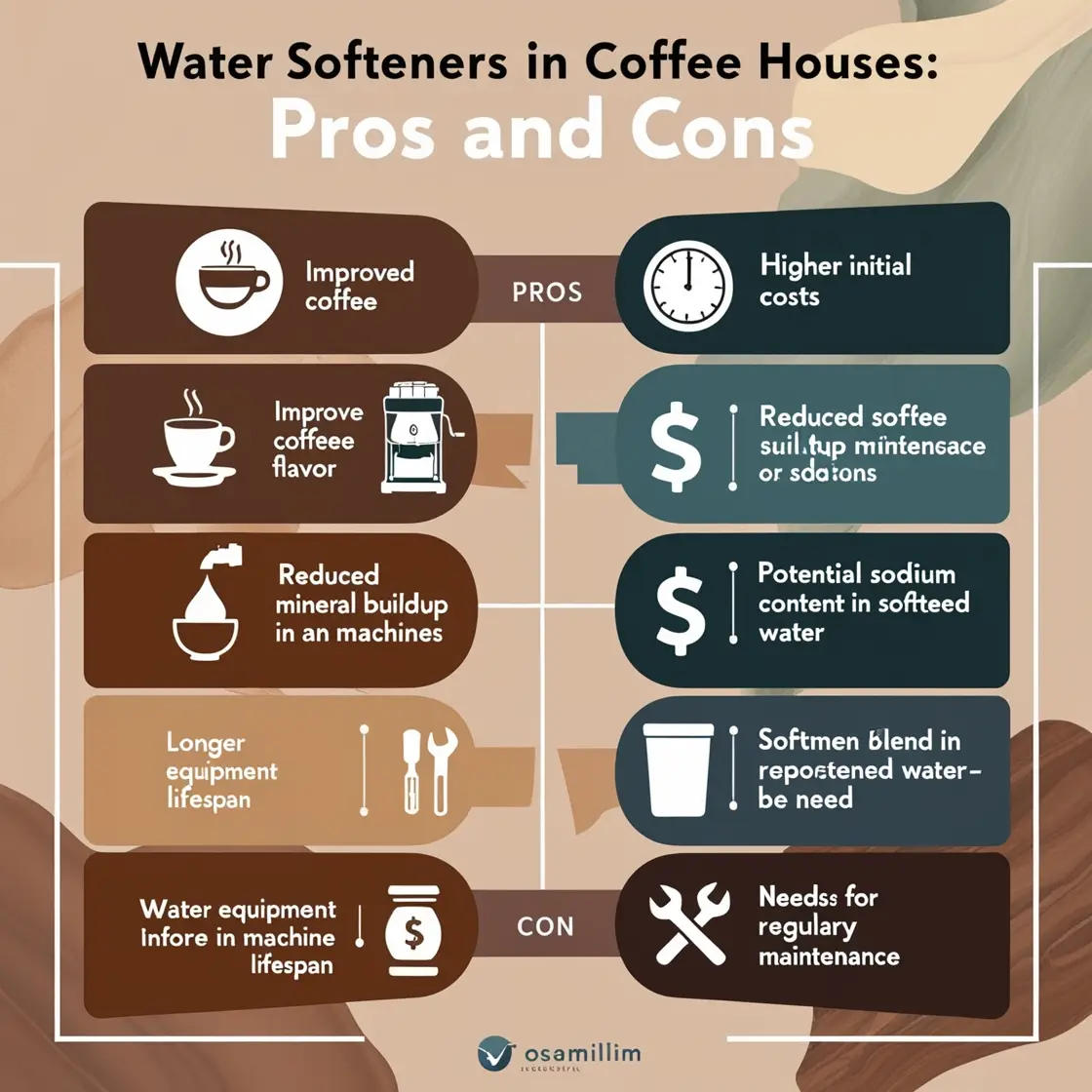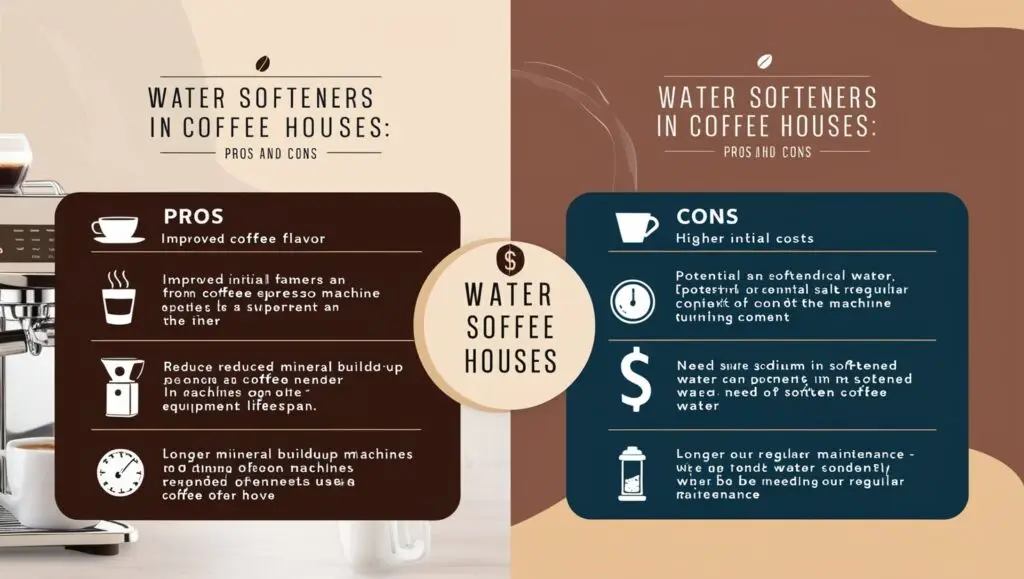The Pros and Cons of Water Softeners for Coffee Houses: A Complete Guide
For coffee houses, water quality is everything. Every cup brewed depends on the mineral content, hardness, and purity of the water used. Water softeners are a popular solution in coffee shops to manage mineral levels and improve water quality. However, the decision to use a water softener comes with its own set of advantages and drawbacks. While softened water can protect equipment and even improve the taste of some brews, it also has potential downsides, particularly when it comes to flavor profiles and maintenance.
This guide takes an in-depth look at the pros and cons of water softeners for coffee houses, helping you decide if this water treatment method aligns with your business goals and coffee quality standards.
Why Water Quality Matters in Coffee Houses
Water quality is crucial in coffee brewing as it directly affects flavor, texture, and consistency. Water hardness refers to the concentration of dissolved minerals, primarily calcium and magnesium, present in the water. Hard water can sometimes enhance flavor but is notorious for causing scale buildup in espresso machines, reducing their efficiency and lifespan.
Water softeners remove or reduce these minerals through ion exchange, typically replacing calcium and magnesium ions with sodium ions. This softening process can lead to cleaner equipment and a smoother flavor but may also impact certain coffee profiles that thrive on specific mineral content. Knowing both the advantages and disadvantages of water softeners can guide coffee shop owners in making an informed decision for their business.
The Pros of Using Water Softeners in Coffee Houses
Water softeners offer several benefits that can make a positive impact on both the operational efficiency of a coffee house and the taste of the coffee itself. Here’s a look at some key benefits:
1. Prevents Scale Buildup in Equipment
One of the most significant advantages of using softened water is the reduction in scale buildup. Hard water leaves behind calcium and magnesium deposits that accumulate in coffee machines, pipes, and boilers. Over time, this buildup can cause malfunctions, increase energy consumption, and reduce the lifespan of equipment. With water softeners, coffee houses can significantly reduce the need for frequent descaling and maintenance.
2. Improves Brew Consistency
Hard water can create inconsistent results, especially in high-volume coffee shops where every cup needs to meet the same quality standards. Softened water ensures that the mineral content remains stable, which can lead to more predictable flavor profiles. This consistency can be a major advantage for coffee houses that want to maintain a reliable flavor experience for their customers.
3. Enhances Certain Coffee Flavors
Water with a balanced mineral profile can improve the extraction process, emphasizing the flavors that contribute to a coffee’s sweetness and acidity. For coffee houses that serve a variety of single-origin or specialty coffees, softened water can help bring out nuanced flavors. While this may not apply to every roast or origin, certain coffees can taste brighter and smoother with softened water, which may appeal to particular customer preferences.
4. Reduces Costs and Maintenance
With less scale buildup, coffee shops spend less on maintenance and repair. Descaling machines can be costly and time-consuming, requiring downtime that affects business. Water softeners reduce the need for frequent descaling, which means lower maintenance costs and a longer lifespan for coffee equipment.
5. Creates a Cleaner Mouthfeel
Softened water can produce a coffee with a smoother texture or mouthfeel, which many customers prefer. The reduced mineral content may eliminate any gritty or chalky textures that can sometimes result from hard water, creating a more enjoyable drinking experience.
The Cons of Using Water Softeners in Coffee Houses
While the benefits are appealing, water softeners also have potential drawbacks. These should be carefully considered, especially if your coffee house prides itself on delivering distinct, high-quality coffee flavors.
1. Alters Flavor Profiles Unintentionally
Some coffees rely on a specific mineral composition to achieve their optimal taste profile. Minerals in water, like calcium and magnesium, interact with the coffee grounds during extraction, influencing the brew’s flavor. Removing these minerals can lead to a muted or “flat” taste, especially in espresso. This may detract from the character of some single-origin coffees, where the unique terroir is best expressed with a balanced mineral content.
2. Sodium Levels in Water
The ion exchange process in water softeners replaces hard minerals with sodium. While the level of sodium introduced is usually low, it could potentially affect taste, particularly for customers sensitive to sodium intake or those who prefer a less salty profile. Some coffee houses may find this alteration in taste noticeable, particularly with lighter roasts where flavor subtleties are more pronounced.
3. Requires Regular Maintenance
Water softeners require regular maintenance to stay effective. Salt or potassium needs to be refilled periodically, and systems must be checked to ensure they are functioning correctly. For coffee houses operating on a tight schedule, this can be an added hassle. If a water softener is not maintained, it can lose efficiency, negating its benefits and possibly affecting coffee quality.
4. Upfront and Operational Costs
Installing a water softener can be a considerable investment, with initial costs for the unit and installation, as well as ongoing operational expenses for salt or potassium. For small coffee houses, this investment might be hard to justify, particularly if water hardness is not a significant issue in their area.
5. Environmental Impact
While water softeners benefit equipment and coffee taste in certain ways, they can have a negative environmental impact. Some systems discharge brine, which can affect local waterways and contribute to pollution. Additionally, frequent use of salt in ion exchange systems contributes to the salt levels in wastewater, which could raise environmental concerns for eco-conscious coffee houses.
Balancing Water Quality and Coffee Flavor: Alternatives to Water Softeners

If the cons of water softeners seem too significant for your coffee house, there are alternatives that can help manage water quality without affecting flavor as dramatically. These methods can offer similar benefits while preserving the distinctiveness of coffee flavors.
1. Filtration Systems
Carbon-based or reverse osmosis (RO) filters can reduce certain minerals and contaminants without removing all the elements that contribute to coffee flavor. While RO systems may strip out almost all minerals, they can be adjusted with remineralization cartridges that allow you to “customize” the water profile, balancing flavor and equipment protection.
2. Partial Softening
Partial softening, where only some minerals are removed, can help balance equipment protection and flavor. This approach is particularly useful in areas where water is not excessively hard, providing a middle ground for coffee shops looking to maintain flavor integrity while reducing scale buildup.
3. Adjusting Brew Ratios and Temperatures
Sometimes, water softening isn’t necessary if adjustments to brew ratios, temperature, or grind size can balance the impact of hard water. While this won’t solve equipment scaling issues, it can provide an option for small coffee houses with minimal equipment or those seeking an unaltered flavor profile.
Making the Decision: Should Your Coffee House Use a Water Softener?
When it comes down to choosing a water softener, every coffee house has unique needs, preferences, and budgets to consider. Here’s a checklist to help guide your decision:
- Evaluate Local Water Hardness: Check the mineral content in your area to see if a softener is needed. In areas with moderate to low hardness, filtration or partial softening may be more practical.
- Consider Your Coffee Menu: Specialty coffee shops or those offering single-origin beans may benefit from alternative methods that maintain a balanced mineral profile to enhance flavor.
- Analyze Costs vs. Maintenance Savings: Compare the initial investment and upkeep costs of water softening with the maintenance savings on equipment. If scale buildup is a persistent issue, a water softener could reduce long-term costs significantly.
- Understand Customer Preferences: Some customers prefer a smoother mouthfeel, while others may appreciate the nuanced flavors minerals bring out in coffee. Your customer base can inform which choice might enhance their coffee experience.
FAQs
How does hard water affect coffee equipment?
- Hard water causes calcium and magnesium buildup, leading to scale that clogs pipes, reduces machine efficiency, and can lead to costly repairs.
Will softened water change the taste of my coffee?
- Yes, softened water can change coffee taste. Removing minerals affects extraction, sometimes leading to a flatter flavor, though it may enhance smoothness.
Can water softeners impact the health of my customers?
- Water softeners using sodium-based ion exchange add minimal sodium, but this could be a factor for customers watching sodium intake or those sensitive to it.
Are there ways to maintain water quality without softening?
- Yes, alternatives include reverse osmosis systems with remineralization, carbon filtration, and partial softening to balance flavor and equipment protection.
What’s the cost range for installing a water softener?
- Initial installation can range from $300 to $3,000 depending on system size and type, with maintenance costs added for refills and upkeep.
Is there an environmental downside to using a water softener?
- Yes, systems that discharge brine can impact waterways, and salt usage in ion exchange processes can contribute to environmental pollution.
Conclusion: Finding the Right Water Solution for Your Coffee House
Choosing whether to use a water softener is a balancing act between preserving coffee flavor, protecting equipment, and meeting budget constraints. For some coffee houses, water softeners provide an excellent solution to prevent scale and improve drink consistency, while for others, they may strip away desirable flavor qualities that come from natural minerals. By understanding the pros and cons of water softeners and exploring alternative water treatments, coffee houses can make the choice that best aligns with their coffee philosophy, customer preferences, and operational goals.
Related Posts

